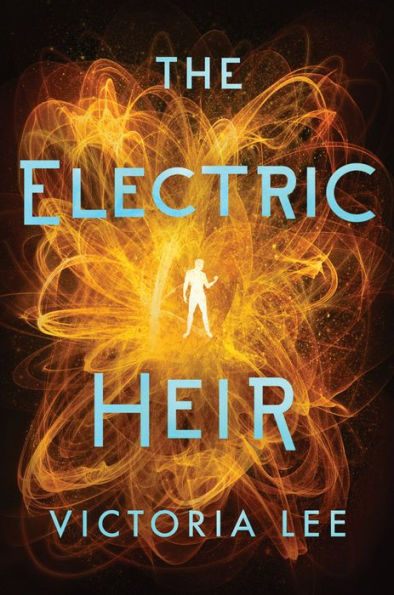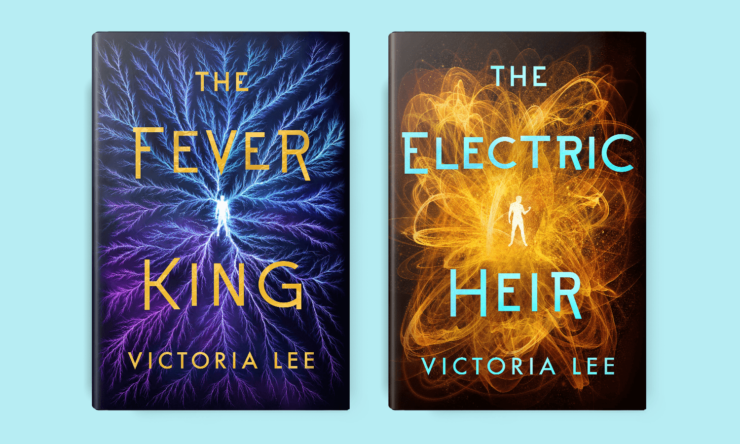In The Electric Heir, the striking, cathartic conclusion to the Feverwake duology, magic isn’t a straightforward experience, and neither is the process of healing. Victoria Lee weaves together a compelling, terrifyingly plausible landscape of revolution with an intricate and original system of magic, but the heart of the two novels centers on an intimate, well-wrought investigation of power and abuse.
Book 1, The Fever King, takes place in a near-future no-longer-United States. A plague of dangerous, viral magic kills a frightening amount of the population—but those who catch it and survive walk away with strange, intricate powers. They’re known as witchlings. Sixteen-year-old Noam Álvaro, a bisexual, biracial Jewish and Latinx teenager, comes from a family of undocumented immigrants, working alongside his community to fight for refugee rights. But everything changes when he survives the magic that kills his family. Noam walks away a technopath—a potent and uniquely exploitable ability that catches the interest of the minister of defense, and thrusts him into the ranks of the magical elite. Noam has to navigate his dedication to the rebel cause from within the thrall of two charismatic, volatile, oppositional leaders—and the magnetic attraction of the minister’s adopted son, a telepath named Dara.
Buy the Book


The Electric Heir
The Electric Heir picks up six months after The Fever King. Here, in the wake of an overthrown government, the terrible secret about an outwardly progressive leader takes root. Noam and his companions must figure out how to rid their homeland of insidious tyranny while keeping themselves alive in the process.
There’s espionage and action—this is in many ways a war story, about the complexities of a revolution, of how to destroy a regime when you’re tangled within it. Throughout both novels, Lee wields magic in compelling, surprising ways—not least in that a character uses mind control for coercion on both political and personal levels, to devastating effect.
While the first book is told through Noam’s point of view, the second alternates with Dara Shirazi’s. This is a crucial, affirming choice, because The Fever King deepens the excavation into Dara’s trauma, and the non-linear process of his recovery. Granting him his own perspective allows for the novel to more intimately explore the messiness of healing, and the result is thoroughly poignant and vindicating to witness on the page.
Please mind the content warnings before reading this duology. They are available on Victoria Lee’s website, as well as within the book. The Feverwake books deal with child abuse, child sexual assault, eating disorders, internalized victim blaming, and other serious traumas. Lehrer is abusive, and as a grown man he engages in sexual relationships with both Noam and Dara when they are teenagers, including when Dara is under his care as an adoptive parent. If you need to skip this content for your own safety, please do.
If you can, though, I urge you to read the sharp, reclamatory narrative Lee has deliberately crafted. They very much write for survivors. For the messy, queer survivors who develop unhealthy coping mechanisms in the wake of trauma and abuse. Who find it difficult, if not impossible at least for a little while, to name what they’ve undergone as abuse or coercion or assault, because naming it means giving up whatever semblance of agency they have to tell themselves they still have, just to keep going, to not get lost in terror and helplessness.
Victoria Lee doesn’t shy away from the violence and shame that can come with healing, but their brutal honesty allows for a deeper catharsis, and they make absolutely sure that Noam and Dara get it. I don’t count that as a spoiler, because I wouldn’t have recommended these books to survivors if these characters don’t find their way out of that desolation, and I do recommend them, because Lee knows how to write active, realistic, complex healing—and that’s actually an entire fucking triumph to read right there on the page. Especially when it’s queer, and they make sure that a) it’s clear that critiquing a gay abuser isn’t homophobic, and b) the queer characters get to have fully realized, healing narratives. Lee gives queer survivors the space to reckon with their own internalized trauma, to ask themselves if they can ever have a happy ending—and then answer with a resounding yes, you absolutely do. You deserve joy, and healing, and a future full of love.
The Feverwake books aren’t only about healing from toxic power dynamics, as a state and as an individual—they’re about cultivating healthy ones, too. Rebuilding, remaking, reimagining a gentler, more welcoming tomorrow. And at the core of that is the relationship between Dara and Noam. Their path is a muddled one, full of missteps. They’re both trying to figure out who they are as people, where they stand, the right way to fight in this war. How to use their powers, and what they’re willing to sacrifice. They also share a significant, devastating trauma, and have conflicting approaches to the aftermath. Ultimately, this allows for a fraught and believable dynamic, that makes it all the more satisfying when they’re able to support each other, and help the other work to love himself.
Love and change don’t always come easy, especially not in a world at war, full of lies and secrecy, cruelty and corruption. And hell, especially not when you’re a queer, depressed, traumatized person of color. But they’re very much worth fighting for anyway, and Lee’s Feverwake novels remind us that we deserve a better future, that there is real magic in fighting for justice—and that within the fight, we are not alone.
The Fever King and The Electric Heir are available from Skyscape.
Maya Gittelman is a queer Pilipinx-Jewish diaspora writer and poet. Their cultural criticism has been published on The Body is Not An Apology and The Dot and Line. Formerly the events and special projects manager at a Manhattan branch of Barnes & Noble, she now works in independent publishing, and is currently at work on a novel.










